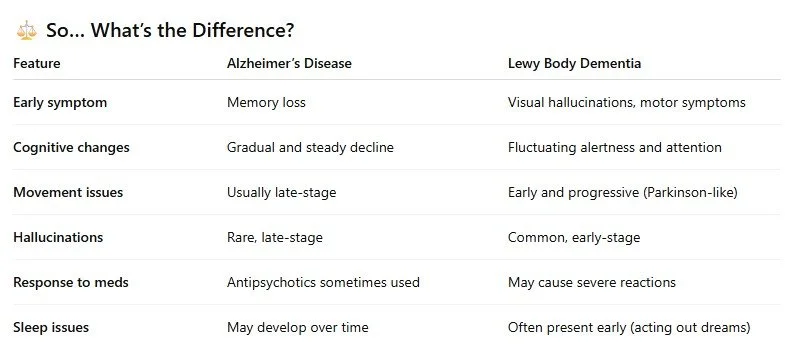“Wait … What Kind of Dementia Is It?”
Understanding the Difference Between Alzheimer’s and Lewy Body Dementia
When someone you love begins to forget things, repeat questions, or act in ways that don’t feel like them, your heart immediately begins searching for answers. Most people recognize the term Alzheimer’s, often used as a catch-all phrase for any kind of memory loss or cognitive decline. But not all dementia is Alzheimer’s and understanding the difference can be life-changing for caregivers and families alike.
Alzheimer’s primarily affects memory first, while Lewy Body Dementia starts with movement issues, hallucinations, and fluctuating thinking before memory loss becomes prominent.
What Is Alzheimer’s Disease?
Alzheimer’s is the most common form of dementia. It’s a progressive brain disorder that slowly destroys memory and thinking skills, and eventually the ability to carry out simple tasks. It’s often characterized by:
Short-term memory loss
Trouble finding words
Getting lost in familiar places
Difficulty organizing or following instructions
Gradual, consistent cognitive decline over time
In later stages, individuals may forget family members, become confused about time and place, and lose the ability to walk or talk. While it primarily affects memory in the early stages, physical and behavioral changes may occur much later.
What Is Lewy Body Dementia?
Lewy Body Dementia is the second most common type of progressive dementia, yet many have never heard of it. LBD is caused by abnormal protein deposits (Lewy bodies) in the brain that disrupt normal brain function. It presents very differently than Alzheimer’s and is often misdiagnosed early on.
Key symptoms include:
Visual hallucinations (often early and persistent)
Fluctuating cognition (alert one moment, confused the next)
Parkinsonism (shuffling gait, tremors, muscle stiffness)
REM sleep behavior disorder (acting out dreams)
Severe sensitivity to antipsychotic medications
Sudden confusion or zoning out
Unlike Alzheimer’s, memory might be relatively intact in the early stages but executive function (decision making, planning) and movement are often impacted much sooner.
Why This Difference Matters
A misdiagnosis can lead to devastating consequences. For example, individuals with LBD can have life-threatening reactions to medications commonly prescribed for hallucinations or behavioral symptoms. Families might feel blindsided by sudden declines, unaware that fluctuations are a hallmark of LBD.
Most importantly, getting the right diagnosis helps caregivers know what to expect as well as how best to support their loved one.
A Final Word to Caregivers
Whether you're walking through LBD or Alzheimer's Disease - or trying to get a diagnosis - it’s okay to feel overwhelmed. Both conditions are progressive, both are difficult, and both require patience, advocacy, and support.
Keep asking questions. Find a team that listens. Connect with others walking a similar road. And remember: you're not alone.
If you’ve faced a confusing diagnosis or felt lost in the search for answers, I see you. I’m living it too.
Let’s keep the conversation going and keep fighting for better understanding, treatment, and support.
Resources You Might Find Helpful:


